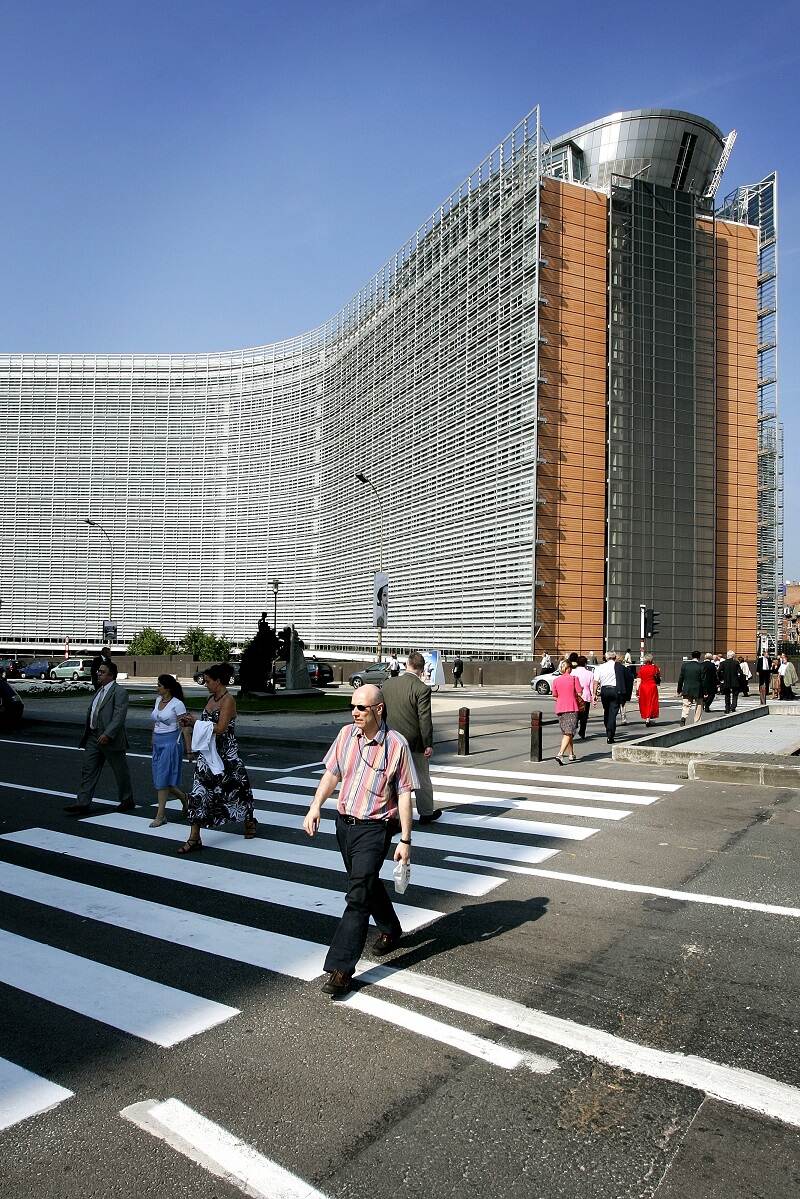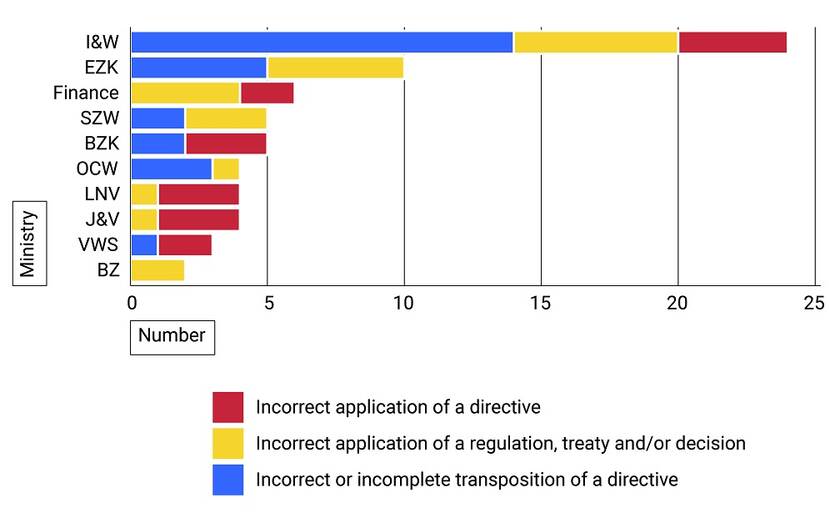Netherlands learns little from disputes with EU
Netherlands average member state for correct implementation of EU law
As a member of the European Union, the Netherlands usually loses when the European Commission takes formal steps to resolve its incorrect or incomplete implementation of EU law. Before the Commission instigates an infringement procedure or refers a case to the Court of Justice of the European Union, however, informal contact often resolves disputes, but ministries learn little from the informal procedures, rarely align and coordinate their policies and critical opinions are seldom heard from the civil service.
Ministers rarely evaluate how infringements of EU law arise and are resolved. If they do reflect on completed procedures, they do so orally and inconsistently.

Diverse and long-running issues
The issues that arise are diverse. One area in which the Netherlands has been taken to task concerns the fees charged for residence permits. Two long-running disputes relate to the Water Framework Directive and the incorrect implementation of the European arrest warrant, which remains unresolved even after 20 years. A dispute about the Integrated Approach to Nitrogen (PAS) has arisen because Dutch policy does not comply with the 1994 EU Habitat Directive. In its audit report entitled EU Law in Practice of 15 June 2023, the Netherlands Court of Audit analyses all the disputes between the EU and the Netherlands between 2010 and 2020 and looks at 9 cases in detail.
[ In figuur: Number of formal infringement procedures instigated by the European Commission against Dutch ministries, 2010-2020 (N = 67).
Most infringement procedures at I&W, mainly because of incorrect or incomplete transposition of a directive

67 infringement procedures against the Netherlands
According to the European Commission, the Netherlands ranks in the middle of the 27 member states for the incorrect or incomplete implementation of EU law. It does not meet the target for the implementation of EU Law. In the period audited (2010-2020), the Commission instigated 67 procedures against the Netherlands for infringement of EU law. It did so because informal dialogue had failed to resolve disputes. The Minister of Infrastructure and Water Management was involved in 24 of the infringements.
Little official coordination
The Ministry of Foreign Affairs coordinates talks among the ministries about the implementation of EU legislative proposals and the practical problems that can arise in the Netherlands. The ministry has an ‘appropriate number’ of civil servants with specific knowledge of EU law to coordinate its implementation. This is far less the case at the Ministry of Justice and Security and the Ministry of Economic Affairs and Climate Policy, which are also responsible for coordination. Civil servants tend to coordinate procedural matters and coordination often starts late. The Hague gives little thought to the risk of the Commission initiating a formal procedure at the Court of Justice. No critical opinions are voiced at the ministries that could help prevent long-running procedures and escalating costs to society. In the interests of the Netherlands, ministers sometimes test – or even breach – the limits of what is permitted. They inform parliament only in broad lines about active or closed infringement procedures and cases referred to the Court of Justice. Parliament receives no information at all about informal procedures.
Consultation on the correct implementation of EU law usually leads to resolution
Records are not kept of all informal contacts between the Commission and the Netherlands or of their outcome. Information from the Commission suggests that informal procedures prevent the Commission instigating formal infringement procedures in most cases. Dialogue with the Netherlands begins when the Commission considers that EU law has not been implemented correctly. Between 2010 and 2020, 264 informal EU Pilot procedures were brought against the Netherlands in response to complaints by citizens and interest groups or, even more often, when the Commission questioned the Netherlands’ application of EU law. Most of the issues concerned the environment, energy policy, and transport and mobility. When the Netherlands was in danger of failing to meet the target set for renewable energy, for instance, it purchased, on paper, renewable energy from Denmark. In two-thirds of the 264 cases, the Commission ultimately accepted the Netherlands’ position and formal procedures were averted. Using another informal procedure, known as SOLVIT, 443 case were brought mainly in the fields of social security and the free movement of people.
Complaints made by citizens and businesses
In the period between 2010 and the end of 2020, the Commission received 1,025 complaints against the Netherlands from citizens, businesses and organisations. They were concerned chiefly with employment (e.g. the Immigration and Naturalisation Service’s refusal to issue visas in accordance with the EU directive), the environment (e.g. French complaints about Dutch electric pulse fishers) and the single market. The Commission considered 164 complaints were warranted and entered into a dialogue with the Netherlands. How the ministers must respond to possible infringements of EU regulations, directives and decisions is not documented. Ministries have only very limited information on how to handle complaints about the implementation of EU law.
| The European Commission makes proposals for new EU legislation. The proposals are approved or rejected mainly by the Council of Ministers in consultation with the European Parliament. The member states therefore have an important say in what the EU does. If a proposal is approved, the Netherlands, like all the 26 other member states, is obliged to take all measures necessary to implement the new EU law. The Commission oversees compliance with this obligation. If it thinks a member state has not implemented EU law correctly or completely, it has several options to take it to task. Informal talks and letters are not made public. Formal steps, such as an infringement procedure or referral of a dispute to the Court of Justice in Luxembourg, however, are made known to the outside world. |